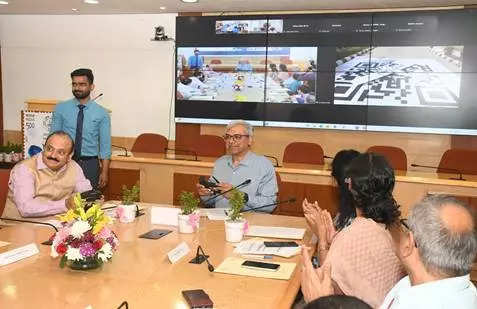
New Delhi: The Indian Council of Medical Research (ICMR) launched a pioneering study on the aerial transport of human corneas and amniotic membrane grafts on Tuesday.
ICMR in collaboration with AIIMS New Delhi and Dr. Shroff’s Charity Eye Hospital and with the support from Ministry of Civil Aviation has conducted a feasibility study to assess the potential of using drones to transport sensitive ophthalmic biomaterials such as human corneas and amniotic membrane grafts from peripheral collection centres to tertiary hospitals for transplantation procedures, in Sonipat and Jhajjar, Haryana.
According to the release, the drone successfully transported corneal tissue from Dr. Shroff’s Charity Eye Hospital (Sonipat centre) to the National Cancer Institute (NCI), AIIMS Jhajjar, and subsequently to AIIMS New Delhi. The distance between the two cities was covered in around 40 minutes via drones which usually takes around 2-2.5 hours to cover via road. The drone maintained optimal conditions for specimen integrity and upon arrival, the cornea was evaluated, leading to a successful transplant surgery.
The timely transportation of corneal tissues is critical, as the viability of donated corneas is time-sensitive. Delays in transportation can compromise tissue quality and reduce the chances of successful transplantation. Drone-based transport offers a swift, temperature-stable, and efficient alternative to traditional road networks, which are often slow or unpredictable—especially in semi-urban or rural areas. This can help bridge the gap between donor sites and recipients, ensuring that no viable tissue goes unused and that more patients regain sight in time.
Commenting on the development, Dr. Rajiv Bahl, Secretary, the Department of Health Research (DHR) and Director General, ICMR, said, “The i-DRONE platform was originally conceived during the COVID-19 pandemic to deliver vaccines to remote regions. Since then, we’ve scaled our efforts to include low-temperature delivery of blood products and essential medicines to high-altitude and sub-zero locations. This cornea transport study marks another step forward—enhancing patient access, ensuring timely transplants, and reducing pressure on overburdened tertiary hospitals.”
Prof. (Dr.) M Srinivas, Director, AIIMS, New Delhi, remarked, “Corneal blindness affects millions in India, and timely availability of donor tissue is often a limiting factor. This drone-based transport model could be a transformative step toward ensuring equitable access to vision-restoring surgeries, especially in underserved areas. The success of this pilot project opens the door to deploying precision drone logistics for a wide range of critical medical applications.”
Through this study, researchers aim to document operational workflows, identify technical bottlenecks, and generate evidence to support the integration of drone logistics in routine medical practice—especially for time-sensitive and temperature-sensitive biological materials like human corneas.

